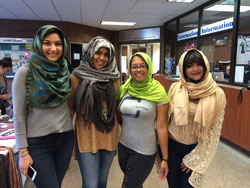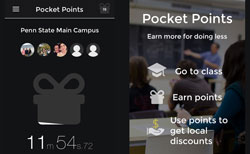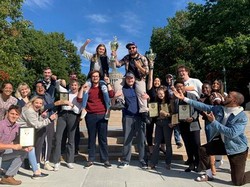World Hijab day at the University was located outside of the dining area of the RSSC, however, Zareen Shueib, treasurer of the MSA, believes the event was successful in reaching its goals. “It was more isolated than other years because of the renovations to the dining area, so we were located in the hallway, but it was still a great event. As a Muslim it showed me that Monmouth students are willing and open to new experiences and knowledge. They don’t let the media influence their choices and opportunities of learning new things,” she said.
“I loved how many students were interested in learning how to wear one [a hijab]. I think it was a wonderful, and humbling experience helping students who were honestly interested in learning how to wear one,” said Ayubi.
Tatiana Castro, a senior marine and environmental biology and policy student, enthusiastically described her experience. “When I first put on the hijab I simply felt beautiful. I don’t know how else to describe it, I just felt so humbled to have the opportunity to learn about the Muslim religion and to be able to put a hijab on without possibly offending anyone. I always wanted to see what it felt like, and having people around you showing you how to put it on, and encouraging you to flaunt it was such a wonderful experience. I loved every minute of it,” she said.
Some were surprised by the number of students willing to try on hijabs, however, others were not. “I have been at Monmouth for the last 18 years, and I have always been so impressed by our students, staff, and faculty members and their enthusiasm for diversity. So it was not surprising to me that students at Monmouth were interested in learning about the hijab,” said Golam Mathbor, Ph.D. is the MSA Advisor, and the chair of the Department of Philosophy, Religion, and Interdisciplinary Studies.
“I am proud of the MSA because events like these always bring curious people of diverse backgrounds together to learn about others. I hope MSA will always hold onto its principles of inclusiveness, co-existence, and peace that is embodied in its constitution,” Mathbor continued.
Momna Ayub is the president of the MSA. She does not wear the hijab, yet she feels that events like World Hijab Day are important aspects of the educational experience. “Exposing the university community to diversity is extremely important and necessary. Monmouth, while not completely homogenous, lacks in minority representation when compared to other universities,” she said. “In an effort to compensate for this, it is important for events providing diversity to attain recognition and interest. This event in particular is very important not only for the university community, but for the nation at large which is faced with a great misunderstanding of American Muslims.”
Emely Diaz, a sophomore political science student and member of LTA, said that it was her first year participating in the event. She said, “The celebration was very enlightening, I learned a lot of new information that I did not know about hijabs and why women wear them. People should know the basics of the hijab; they don’t know enough about it. It’s supposed to be a personal choice, and I feel that many people are not educated enough about that.”
According to WorldHijabDay.com, the holiday was founded in NY by a Muslim woman named Nazma Khan. She initiated the first World Hijab Day on Feb. 1, 2013. Khan sought to create a day that would foster tolerance and end discrimination by inviting non-Muslim women to wear the hijab for a day. The vision sprouted after facing much discrimination for her religion and hijab post 9/11.
Today, World Hijab Day has spread to over 140 countries. It is organized through social media, and participants are connected through hashtags. Mainstream news organizations have covered this global movement since its origination.
Diaz said, “The event was affective in stopping ignorance on campus. LTA will definitely co-sponsor it again next year with the MSA, and I hope that students that did not participate stop by next time.”
PHOTO TAKEN by Jamilah McMillan




